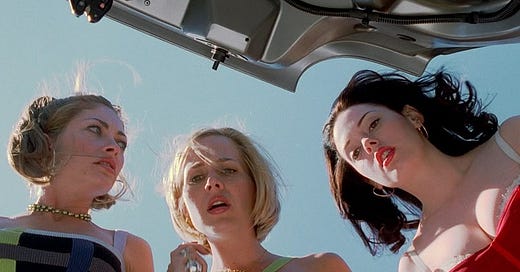Pop culture gets a bad rap.
For many, pop culture reporting is synonymous with the tabloids at the checkout line in the grocery store—their misogynistic, tantalizing titles and fabrications.
When we socially rank the value of podcasts, we put podcasts covering “hard news” like The Daily over any “soft news” pop culture recap podcast because one is smart and the other is not.
This just doesn’t have to be true. Pop culture is still culture. It is human behavior; it is the zeitgeist, and it is worthy of conversation.
How we discuss pop culture then becomes more important than what it is we are discussing.
We can talk about the Blake Lively v. Justin Baldoni lawsuit in a way that poses questions about retaliation against women who speak out in the workplace, or how public opinion struggles to reconcile with an imperfect victim (Blake).
This week’s weekly digs are all about conscious pop culture. This all started for me when I had to break up with my daily pop culture podcast: The Morning Toast.
D- doing
Considering pop culture as culture.
Pop culture and politics have become inextricably linked in our society as public figures make appearances on SNL and then in the Oval Office. It is impossible to talk about pop culture without talking about politics- think Brat Summer and Kamala’s presidential campaign.
What this means is that it has become impossible to report on pop culture without reporting on politics. This also means it has become harder to listen to someone’s takes on pop culture when their view of politics is incongruous with those of your own.
Over the past 5 years that I have listened to The Morning Toast, I have had to skip through segments and coverage of certain topics because I didn’t want to know their “hot take” as I knew it would not align with my values and hearing it would only complicate the hour of enjoyment I got from listening to this daily podcast.
As politics and pop culture became increasingly more intertwined there became a point where I had to quit listening to The Toast cold turkey.
I- am interested in
Conscious pop culture.
I think what was missing from The Morning Toast (which only became more clear with the post-election political atmosphere) was their reductive nature of pop culture reporting.
The hosts pick the top five celebrity stories in the press, read the headlines, and then give their takes. Rarely does it seem that they read the rest of the article, let alone consider the reporting critically.
Enter the Shameless Podcast by Shameless Media hosted by Melbourne-based writers Zara McDonald and Michelle Andrews.
Poignantly dubbed “the pop culture podcast for smart people who love dumb stuff,” Shameless researches and analyzes trending topics and stories in pop culture with a socially conscious and critical lens.
SCANDAL Series
In the Scandal Series, McDonald and Andrews break down a celebrity scandal, combining years of reporting and commentary. Usually looking at the “scandal” with a hindsight perspective and, therefore, able to apply an added critical lens to media perception, public opinion, and the nature of celebrity.
My favorite episode so far was the Summer Scandal:Julia Roberts,runaway bride, which covered her rise to fame, her moniker as “America’s Sweetheart,” and her public image, which at times juxtaposed her public perception.
G- getting
Too Fat, Too Slutty, Too Loud: The Rise and Reign of the Unruly Woman by Anne Helen Petersen
This week’s getting is this book by journalist, BuzzFeed senior culture writer, and author of the Substack Culture Study, Anne Helen Peterson.
I devoured this book in a few days. In each of the 10 chapters, Peterson analyzes one female celebrity who has gotten the rap of being “too (enter synonym for unruly here)”.
In the first chapter, Peterson details how Serena Williams was regarded as “too strong” throughout her tennis career. A label that was inherently tied to her blackness in a white sport.
Each chapter shares a common theme of the unruliness of these female figures and how the dialogue around them in society aims to reconcile that unruliness within the structure of accepted femininity.
What the book achieves (amongst other things) is a thought provoking and sociological exploration of female figures and the gender normative bounds that define popular culture.
S-suggesting
I am suggesting not that we change the way we discuss pop culture to be more critical by giving more consideration to the way it is reported and who is doing that reporting.
If we consider pop culture as culture we acknowledge its inseparable nature from the socio-political.
This does not mean that conversations on pop culture become devoid of entertainment. We can both revel in the scandal of a public figure while critically examine the structures that enabled their publicity crisis.






